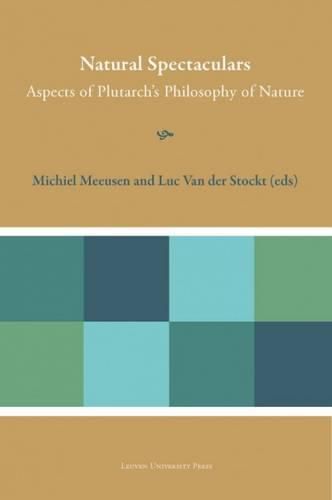Readings Newsletter
Become a Readings Member to make your shopping experience even easier.
Sign in or sign up for free!
You’re not far away from qualifying for FREE standard shipping within Australia
You’ve qualified for FREE standard shipping within Australia
The cart is loading…






This title is printed to order. This book may have been self-published. If so, we cannot guarantee the quality of the content. In the main most books will have gone through the editing process however some may not. We therefore suggest that you be aware of this before ordering this book. If in doubt check either the author or publisher’s details as we are unable to accept any returns unless they are faulty. Please contact us if you have any questions.
As a philosopher and intellectual, Plutarch was very interested in the natural world around him, not only in terms of its elementary composition and physical processes but also with respect to its providential ordering and wonders. His natural philosophical writings teach us much about his perception of physical reality and about his well-reflected attitude to the natural spectacle. He found his greatest inspiration in the ontological and epistemological framework of Plato’s Timaeus, but many other philosophers and writers were also of seminal interest to his project. Clearly, the literary value of Plutarch’s natural philosophical writings should not be underrated, nor should their rhetorical goals be discarded as futile. Recently scholars have begun to reassess the ancient scientific value of Plutarch’s natural philosophical writings. Natural Spectaculars aims to give further impetus to this project by treating several aspects of Plutarch’s natural philosophy that have not been explored before. Contributors: Paola Volpe Cacciatore (Universita degli Studi di Salerno), Angelo Casanova (Universita degli Studi di Firenze), Bram Demulder (KU Leuven), Ana Ferreira (Universidade do Porto), Israel Munoz Gallarte (Universidad de Cordoba), Luisa Lesage Garriga (Universidad de Malaga), Aurelio Perez Jimenez (Universidad de Malaga), Lautaro Roig Lanzillotta (Rijksuniversiteit Groningen), Delfim Ferreira Leao (Universidade de Coimbra), Michiel Meeusen (KU Leuven), Jan Opsomer (KU Leuven), Aldo Setaioli (Universita degli Studi di Perugia), Suzan Sierksma-Agteres (Rijksuniversiteit Groningen), Fabio Tanga (Universita degli Studi di Salerno)
$9.00 standard shipping within Australia
FREE standard shipping within Australia for orders over $100.00
Express & International shipping calculated at checkout
This title is printed to order. This book may have been self-published. If so, we cannot guarantee the quality of the content. In the main most books will have gone through the editing process however some may not. We therefore suggest that you be aware of this before ordering this book. If in doubt check either the author or publisher’s details as we are unable to accept any returns unless they are faulty. Please contact us if you have any questions.
As a philosopher and intellectual, Plutarch was very interested in the natural world around him, not only in terms of its elementary composition and physical processes but also with respect to its providential ordering and wonders. His natural philosophical writings teach us much about his perception of physical reality and about his well-reflected attitude to the natural spectacle. He found his greatest inspiration in the ontological and epistemological framework of Plato’s Timaeus, but many other philosophers and writers were also of seminal interest to his project. Clearly, the literary value of Plutarch’s natural philosophical writings should not be underrated, nor should their rhetorical goals be discarded as futile. Recently scholars have begun to reassess the ancient scientific value of Plutarch’s natural philosophical writings. Natural Spectaculars aims to give further impetus to this project by treating several aspects of Plutarch’s natural philosophy that have not been explored before. Contributors: Paola Volpe Cacciatore (Universita degli Studi di Salerno), Angelo Casanova (Universita degli Studi di Firenze), Bram Demulder (KU Leuven), Ana Ferreira (Universidade do Porto), Israel Munoz Gallarte (Universidad de Cordoba), Luisa Lesage Garriga (Universidad de Malaga), Aurelio Perez Jimenez (Universidad de Malaga), Lautaro Roig Lanzillotta (Rijksuniversiteit Groningen), Delfim Ferreira Leao (Universidade de Coimbra), Michiel Meeusen (KU Leuven), Jan Opsomer (KU Leuven), Aldo Setaioli (Universita degli Studi di Perugia), Suzan Sierksma-Agteres (Rijksuniversiteit Groningen), Fabio Tanga (Universita degli Studi di Salerno)